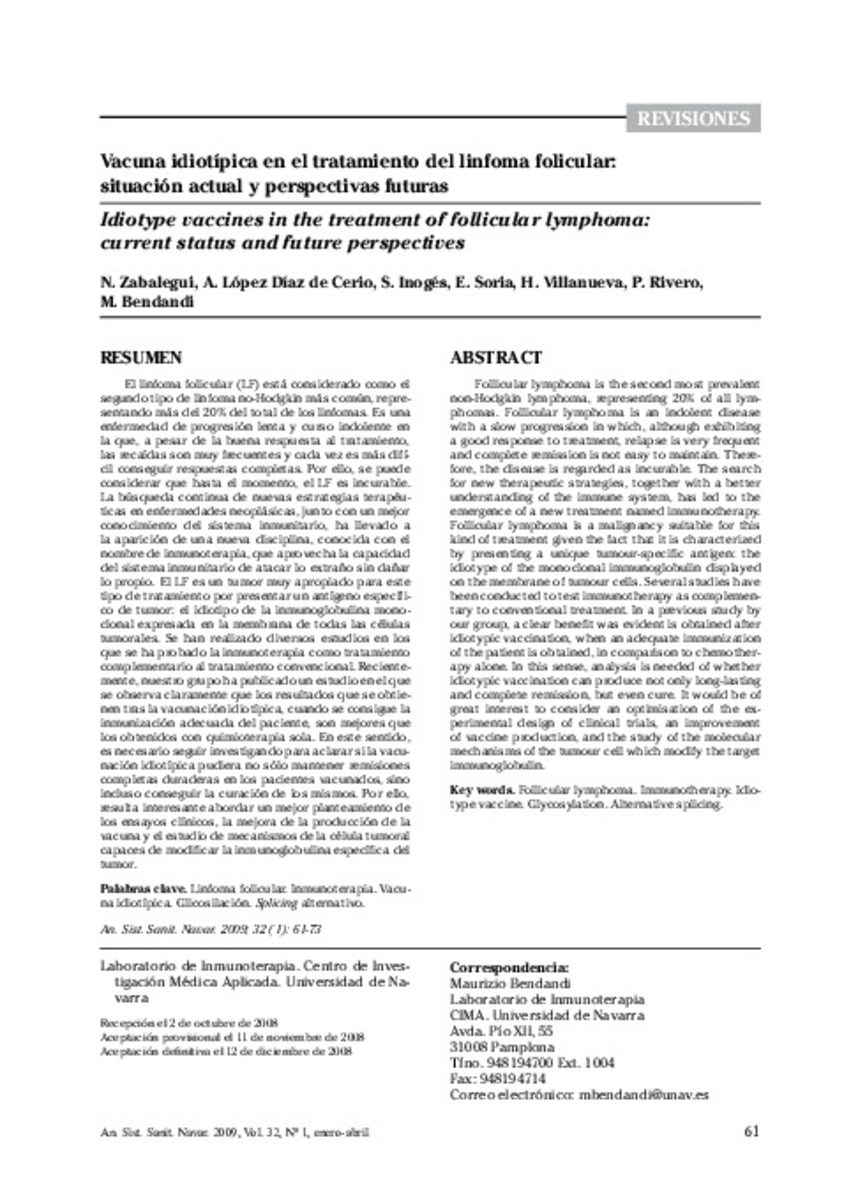Full metadata record
| DC Field | Value | Language |
|---|---|---|
| dc.creator | Zabalegui, N. (Natalia) | - |
| dc.creator | Lopez-Diaz-de-Cerio, A. (Ascensión) | - |
| dc.creator | Inoges, S. (Susana) | - |
| dc.creator | Soria, E. (Elena) | - |
| dc.creator | Villanueva, H. (Helena) | - |
| dc.creator | Tañá-Rivero, P. (Pedro) | - |
| dc.creator | Bendandi, M. (Maurizio) | - |
| dc.date.accessioned | 2023-01-31T07:31:17Z | - |
| dc.date.available | 2023-01-31T07:31:17Z | - |
| dc.date.issued | 2009 | - |
| dc.identifier.citation | Zabalegui, N. (Natalia); Lopez-Diaz-de-Cerio, A. (Ascensión); Inoges, S. (Susana); et al. "Vacuna idiotípica en el tratamiento del linfoma folicular: situación actual y perspectivas futuras". Anales del Sistema Sanitario de Navarra. 32 (1), 2009, 61 - 73 | es_ES |
| dc.identifier.issn | 1137-6902 | - |
| dc.identifier.uri | https://hdl.handle.net/10171/65208 | - |
| dc.description.abstract | El linfoma folicular (LF) está considerado como el segundo tipo de linfoma no-Hodgkin más común, representando más del 20% del total de los linfomas. Es una enfermedad de progresión lenta y curso indolente en la que, a pesar de la buena respuesta al tratamiento, las recaídas son muy frecuentes y cada vez es más difícil conseguir respuestas completas. Por ello, se puede considerar que hasta el momento, el LF es incurable. La búsqueda continua de nuevas estrategias terapéuticas en enfermedades neoplásicas, junto con un mejor conocimiento del sistema inmunitario, ha llevado a la aparición de una nueva disciplina, conocida con el nombre de inmunoterapia, que aprovecha la capacidad del sistema inmunitario de atacar lo extraño sin dañar lo propio. El LF es un tumor muy apropiado para este tipo de tratamiento por presentar un antígeno específico de tumor: el idiotipo de la inmunoglobulina monoclonal expresada en la membrana de todas las células tumorales. Se han realizado diversos estudios en los que se ha probado la inmunoterapia como tratamiento complementario al tratamiento convencional. Recientemente, nuestro grupo ha publicado un estudio en el que se observa claramente que los resultados que se obtienen tras la vacunación idiotípica, cuando se consigue la inmunización adecuada del paciente, son mejores que los obtenidos con quimioterapia sola. En este sentido, es necesario seguir investigando para aclarar si la vacunación idiotípica pudiera no sólo mantener remisiones completas duraderas en los pacientes vacunados, sino incluso conseguir la curación de los mismos. Por ello, resulta interesante abordar un mejor planteamiento de los ensayos clínicos, la mejora de la producción de la vacuna y el estudio de mecanismos de la célula tumoral capaces de modificar la inmunoglobulina específica del tumor. | es_ES |
| dc.description.abstract | Follicular lymphoma is the second most prevalent non-Hodgkin lymphoma, representing 20% of all lymphomas. Follicular lymphoma is an indolent disease with a slow progression in which, although exhibiting a good response to treatment, relapse is very frequent and complete remission is not easy to maintain. Therefore, the disease is regarded as incurable. The search for new therapeutic strategies, together with a better understanding of the immune system, has led to the emergence of a new treatment named immunotherapy. Follicular lymphoma is a malignancy suitable for this kind of treatment given the fact that it is characterized by presenting a unique tumour-specific antigen: the idiotype of the monoclonal immunoglobulin displayed on the membrane of tumour cells. Several studies have been conducted to test immunotherapy as complementary to conventional treatment. In a previous study by our group, a clear benefit was evident is obtained after idiotypic vaccination, when an adequate immunization of the patient is obtained, in comparison to chemotherapy alone. In this sense, analysis is needed of whether idiotypic vaccination can produce not only long-lasting and complete remission, but even cure. It would be of great interest to consider an optimisation of the experimental design of clinical trials, an improvement of vaccine production, and the study of the molecular mechanisms of the tumour cell which modify the target immunoglobulin. | es_ES |
| dc.language.iso | spa | es_ES |
| dc.rights | info:eu-repo/semantics/openAccess | es_ES |
| dc.subject | Linfoma folicular | es_ES |
| dc.subject | Inmunoterapia | es_ES |
| dc.subject | Vacuna idiotípica | es_ES |
| dc.subject | Glicosilación | es_ES |
| dc.subject | Splicing alternativo | es_ES |
| dc.subject | Follicular lymphoma | es_ES |
| dc.subject | Immunotherapy | es_ES |
| dc.subject | Idiotype vaccine | es_ES |
| dc.subject | Glycosylation | es_ES |
| dc.subject | Alternative splicing | es_ES |
| dc.title | Vacuna idiotípica en el tratamiento del linfoma folicular: situación actual y perspectivas futuras | es_ES |
| dc.title.alternative | Idiotype vaccines in the treatment of follicular lymphoma: current status and future perspectives | es_ES |
| dc.type | info:eu-repo/semantics/article | es_ES |
| dc.publisher.place | Navarra | es_ES |
| dc.description.note | CC BY NC | es_ES |
| dc.identifier.doi | 10.4321/s1137-66272009000100007 | - |
| dadun.citation.endingPage | 73 | es_ES |
| dadun.citation.number | 1 | es_ES |
| dadun.citation.publicationName | Anales del Sistema Sanitario de Navarra | es_ES |
| dadun.citation.startingPage | 61 | es_ES |
| dadun.citation.volume | 32 | es_ES |
| dc.identifier.pmid | 19430512 | - |
Files in This Item:
Statistics and impact
Items in Dadun are protected by copyright, with all rights reserved, unless otherwise indicated.






